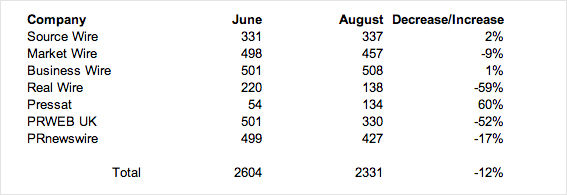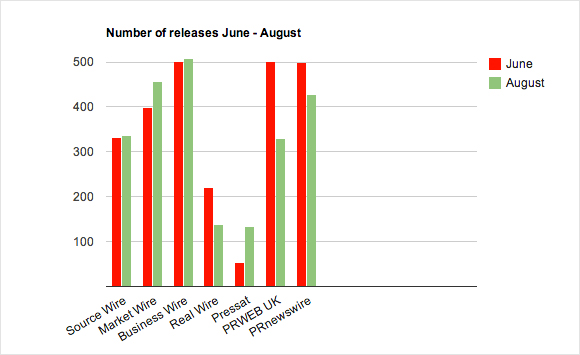Google sent a shockwave through the PR industry last month with a link scheme update that enforced new guidelines within press releases.
The update was quietly introduced on the 25th of July however key industry bloggers did not pickup up on the changes until a few days later. With that in mind we decided to compare the submission rates throughout the months of June and August for a number of leading newswires.
Statistics are based on public submission rates available for each respective provider. The purpose of this review was to identify any early trends and casualties of the update.
The results
On the whole, the results show a 12% decrease in the number of submissions across the industry. However the above statistics do not differentiate between traditional press releases and SEO press releases. This makes it somewhat harder to identify if the drop in submissions is associated with ‘regular companies’, PR agencies or seo companies . This is because the line between the two has been blurring for quite some time now with many PR agencies providing a combination of both PR and SEO as they become more ‘digital’.
Laura Crimmons from Branded3 said:
The kind of press releases that real PRs send out would not go out on a news wire and would not contain anchor text links (in all honesty, most PRs still don’t know what an anchor text link is!).”
What Laura suggests hits the nail on the head for traditional PR agencies who have no interest in increasing a clients search engine position.
The biggest loser
The newswire which took one of the biggest hits in submissions according to our research was PRWEB. They sustained a 52% decrease in August. PRWEB were also outed by Search Engine Land’s founding Editor, Danny Sullivan “How PRWeb Helps Distribute Crap Into Google & News Sites“, when he questioned PRWEB’s integrity for publishing a viagra related press release.
For quite some time now PRWEB was the hidden gem of the search industry. In fact a quick search for “PRweb SEO” pulls thousands of results glamourising the SEO benefits of submitting to PRWEB. This may well be one of the reasons their submissions have dropped by more than half?
A quick search on several Blackhat SEO forums also returns multiple pre-built press release submission packages. These are being offered by vendors to game Google’s search results by combining the PRWEB syndication option with other newswires . Their is no quality to this type of press release as the content produced is not newsworthy nor is it intended to be. It’s sole purpose is to unnaturally increase search position. Could these shenanigans and PR exploitation be the driving force behind Google’s intervention?
What changed Google’s spam team to push the new update? Several people blamed PRWEB, cough *Media Bistro* for ruining the PR/SEO love relationship after a fake press release was published claiming that Google acquired ICOA. The impact was rather disturbing and effected several stocks after the news outlets were duped into the thinking the news was legitimate. Did the fake press release PR Web distributed prick the ears of the Google spam team?
That said, despite a lot of the internet chatter blaming PRWEB, as a distribution service ourselves we appreciate its not always that easy to filter the wheat from the chaff, so to speak. Every single release that enters the system is not always of the highest quality or definitely news worthy. In fact most of the time distributors are second guessing what are journalist may or may not want so news that some deem newsworthy may just be brushed off and ignored.
That said, Google’s play here is to simply stop press releases that result in its algorithms being abused. Its time PR went back to being PR. After all a press release was not born to influence the SERPS nor is (or should) that be its primary objective.
The SEO part of PR is dead
Crafting a newsworthy story that packs a punch will naturally encourage people to link back to your website, subliminal SEO anyone? No more will an article masked as a press release, stuffed with anchor links be accepted (although some would argue it never should have been accepted). In fact we’ve distributed news stories for clients which have gone on to gain multiple editorial links and citations from the BBC, Metro, Guardian, Telegraph and countless smaller publications, the ongoing search effect from that is unbeatable. However these stories gained coverage because they deserved it. The content was of a high standard and the news was of value.
Dominic Hiatt, CEO, Just In Time PR, commented:
“We get high quality links because we know journalists, know the ones that take links and know what it takes to achieve a link. For example, simply contributing to a story probably won’t get you a link, but driving a story or writing a placed article often does.”
“We put the odd link into a press release but that’s there to make life easy for the journalist. We don’t expect that link to suddenly appear online in their story.
“We have worked with doctors for a number of years and have always been hounded to ask journalists for links. Sometimes we do, sometimes we tell the client to forget it. We know when to ask and we know when it’s going to piss a journalist off.
“I’m glad to see all these low quality PR wires are getting hammered. They add zero quality and are a total waste of money.”
The end game
One last thought that’s worth throwing into the mix is false flags. Google has on many occasions pushed for change which has always ruffled the feathers of the search industry. We’ve seen it all before with the likes of blog comments for example. Apparently blog comments do nothing for SEO, yet the facts say otherwise!
If nothing else rest assured that the remaining months of 2013 and 2014 are going to encourage some high quality content generation.


